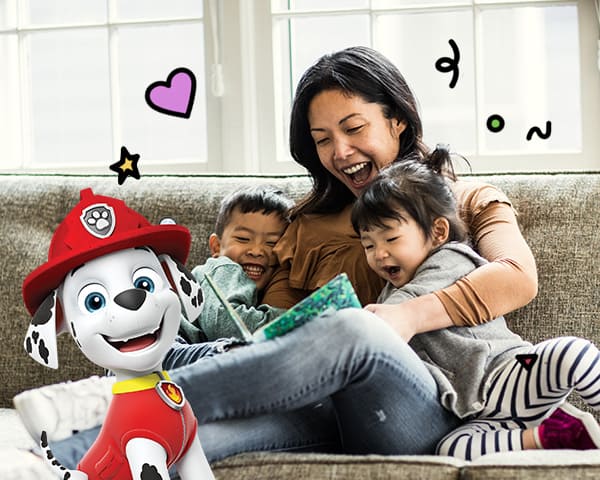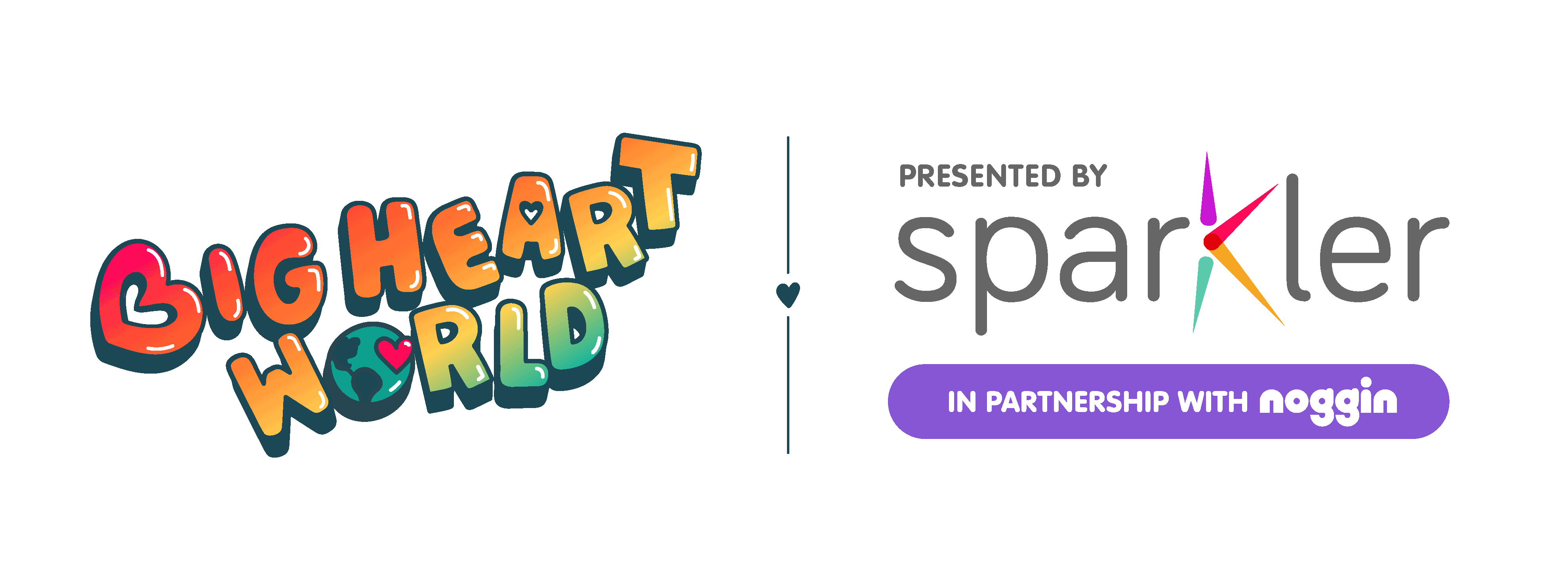
Welcome toBig Heart World
Big Heart World is an initiative produced by Sparkler in collaboration with Noggin that enables parents and educators to help children explore what it means to have a “big heart” and how to grow one. This means:
- Learning About Me — Awareness of self: identity & belonging, feelings and self-regulation
- Learning About You — Awareness of others: empathy, appreciation of diversity
- Learning About Us — Relationships with others: interpersonal strategies
To succeed in school and in life, children can’t just be little mathematicians, readers, and scientists; they need to grow confident in themselves; they need to understand others; and they need to work together with others to solve problems. Educators and pediatricians often refer to this set of skills as “social and emotional” skills. We like to think of them as what it takes to have “a big heart.”
“Heart” skills are always important, but they are especially top-of-mind today as we cope with global pandemic, inequality, and social discord. Families and educators are wondering:
- How can I help my child manage feelings, especially anger, frustration, and sadness?
- How can I help my child develop social and communication skills when they’re separate from peers?
- How can I prepare my child to “phase back in” and restart “normal” life?
Big Heart World is a place where parents, caregivers, and educators can ask and answer big questions related to children’s social and emotional learning. If you’re wondering how to help your child express their feelings, figure out friendships, share, get ready to go back into a classroom, or learn what makes them special, this site is for you. If you’re feeling overwhelmed by the pandemic, school closures, and endless change and transition, this site is for you. If you feel like you can’t handle one more tantrum and you want to know what your child is really trying to tell you when they act out, this site is for you.
Each month, Big Heart World will provide new science-based, engaging content, including Noggin’s Big Heart Beats music videos, answers from experts, podcasts, play-based learning activities, and more.
The work draws from a body of research that recognizes the vital importance of these skills to children’s positive outcomes. Social and emotional development in early childhood lays the foundation for children’s development throughout life. Helping young children build the skills today to develop positive relationships, feel confident in themselves, identify and manage their emotions, and stand up for what is right, will help them to succeed in school and transform them into the leaders and change-makers of tomorrow (C. C. Raver, 2002).
Below, learn more about the themes Big Heart World will explore so you know what to expect.
We’ve all been through a lot in the last year. Take a deep breath. Let’s build up ourselves; let’s build up our kids. Let’s build big hearts.
How wonderful would it be if everyone lived in a Big Heart World?
Global Citizenship: Unit 9
“If I am an advocate for anything, it is to move. As far as you can, as much as you can. Across the ocean, or simply across the river. Walk in someone else’s shoes or at least eat their food. It’s a plus for everybody.” — Anthony Bourdain
“Now is the time for all of us to take our share of responsibility for a global response to global challenges.” — Barack Obama
Global citizenship is a BIG idea for all of us! What does it mean to be part of a family, a community, and a WHOLE world? How can we be good citizens of of our planet?
Thinking about the ideas of global citizenship with children will help them learn be inclusive friends, flexible thinkers, and better stewards of our planet for a lifetime.
Global citizens recognize that we are all living here together on the Earth, and that we are all truly more alike than we are different. Global citizens understand that the world is an enormous community, filled with people of all different cultures, religions, and ways of living, whose decisions impact one another and the Earth as a whole. As global citizens, it is our responsibility to take care of the planet we call home, and all of the people who live here.
To think of themselves as citizens of the world, children will need to access all of the Big Heart World skills that we learned starting in Unit 1: Children will have to know themselves and feel a sense of belonging; they will need to empathize with others; they will need to be good friends, solve problems, and use their voices to stand up for what is right — for themselves and for others.
As children explore the activities, books, music, and other content related to “global citizenship,” they will start to understand that they are an important part of a global community that is large and diverse, and extends far beyond their immediate environment. They will see similarities and celebrate differences among the world’s people, use their empathy skills to identify with others, and use their problem solving skills to work to achieve solutions to big challenges like climate change and human rights. They will see that we are all interconnected, and that their actions can affect others across the globe.
As global citizens, you and your children will be working to make the world a better place for themselves, their communities, and for people around the world.
Big Heart World: Overview
What does it mean to have a big heart? That’s a BIG question! Big Heart World empowers parents, caregivers, and educators to teach children about “me” (identity & belonging, feelings, and similarities & differences), “others” (friendship, empathy, and problem solving), and “us” (helping, standing up, and citizenship).
Identity & Belonging
Our identity makes us who we are. This includes our skills, passions, preferences, physical traits, culture, and language.
Feelings
Identifying emotions and managing them helps us build relationships and overcome challenges.
Similarities & Differences
Recognizing similarities and differences helps us appreciate that we have a lot in common and that everyone is unique.
Friendship
Interacting with others and treating them with kindness helps us form strong relationships.
Empathy
Walking in others’ shoes helps us understand others and form stronger relationships with them.
Problem Solving
Sharing, listening to others, solving problems together, and taking turns helps us collaborate with others.
Helping
Being kind, fair, and helping others helps us become great friends, neighbors, and community members.
Upstanding
When we see something wrong, we can learn to stand up for what’s right. Learning to stand up will help children grow up to be change-makers.
Global Citizenship
Each of us is part of a BIG world: together, we can make the world a better, kinder place.
